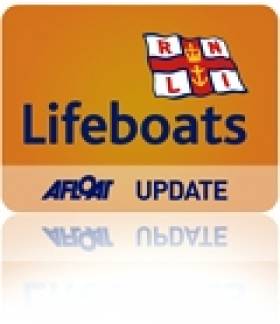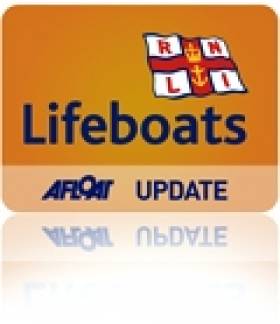Displaying items by tag: Sea Shanty Festival
Open Day Success at Wicklow Lifeboat Station
#RNLI - A steady stream of people were welcomed by Wicklow RNLI at the lifeboat station's annual open day on Sunday 14 July.
Doors opened at 11am and the volunteer lifeboat crew was on hand to give tours of the station and its two lifeboats.
Activities included face painting and a joint display by Wicklow Fire and Ambulance Services. Garda, Customs and Civil Defence also put on displays throughout the afternoon, while the Irish Coast Guard helicopter flew over with the winch crew waving to the crowd below.
The final display was a simulated call-out of the inshore lifeboat. The three crew members onboard demonstrated how fast they could get into their lifeboat gear and launch.
The planned exercise involved a rescue to an injured sailor from a boat which was located in front of the crowd. The crew handed him over to a waiting ambulance.
Folk group Sheringham Shantymen travelled from Norfolk for the open day to see the station's inshore boat, which the group funded and which was named in their honour at a ceremony in 2007.
The Shantymen entertained the crowd with music and concluded the open day with a rendition of the lifeboat anthem, Home From The Sea.
Speaking after the event, Wicklow RNLI volunteer lifeboat press officer Tommy Dover said: "We have had a fantastic weekend with the Sheringham Shantymen. One of the highlights was the concert on Saturday night where the crew was invited to join the group on stage to sing Home From the Sea.
"The crew has a long association with the Shantymen and the lifeboat they funded has rescued 32 people to date at Wicklow."
Meanwhile, a successful sea safety roadshow was held at Sligo Bay RNLI during the weekend's Sea Shanty Festival.
Numerous lifejackets were checked with many having various faults such as corded cylinder, loose cylinder or out of date firing heads. Many people also sought advice about flares, anchors and VHF radios.
RNLI Sea Safety Roadshow adviser Joe Morr said: "It was a very successful weekend in Rosses Point and I hope to bring the roadshow back again next year."
Sligo Bay RNLI Celebrates 15th Anniversary This Weekend
#RNLI - Sligo Bay RNLI will celebrate its 15th anniversary this Sunday (16 June) with an open day at the lifeboat station in Rosses Point.
There will be an opportunity to chat to the crew, have a look around the station, visit the lifeboat shop and enjoy the seafaring music provided by the groups involved in the Sea Shanty Festival which is also taking place this weekend from 14-16 June.
Sligo Bay RNLI began life in a prefab cabin at Sligo Yacht Club back in 1998. Construction on the new lifeboat station situated at the pier in Rosses Point was completed in 2002. It houses a D Class lifeboat named Elsinore and has 22 volunteer crew members, along with a fundraising team and a lifeboat shop.
As part of the Sea Shanty Festival there will a gala concert in the Yeats Country Hotel on Saturday night (15 June), all proceeds from which will go the Sligo Bay lifeboat station. Tickets are available from the lifeboat station shop, Bay View Stores, Rosses Point and Source on John St in Sligo.
Elsewhere, RNLI volunteers and supporters from around Ireland were recognised for their role in supporting and raising funds and awareness for the lifesaving charity and its crews at the RNLI Annual Presentation of Awards in the Great Hall at Trinity College Dublin.
Guest of honour was the outgoing chairman of the RNLI, Admiral the Lord Boyce, who handed out awards to 51 volunteers throughout Ireland.
Irish Coast Guard director Chris Reynolds and his wife Geraldine along with Irish Water Safety CEO John Leech were also in attendance at the ceremony, presided over by the chairman of the RNLI Council of Ireland, John Coyle.
Awards presented on the day included two Gold Badges, four Silver Badges, 19 statuettes, 17 Bronze Badges, one pair of RNLI binoculars and eight Supporter Awards.
The Gold Badges were received by Jackie O’Grady from Clifden RNLI branch for his work over 25 years with the station, and to Hugh Stafford in Wexford for his role in the setting up of the Fethard-on-Sea lifeboat station in the early 1990s and his work since then in raising funds for the charity.
Also receiving an RNLI statuette was former lifeboat man at Rosslare Harbour, Fergus Wickham, who was recognised for almost five decades of volunteering with the RNLI, first as a lifeboat man and then as a launching authority at the station.

























































